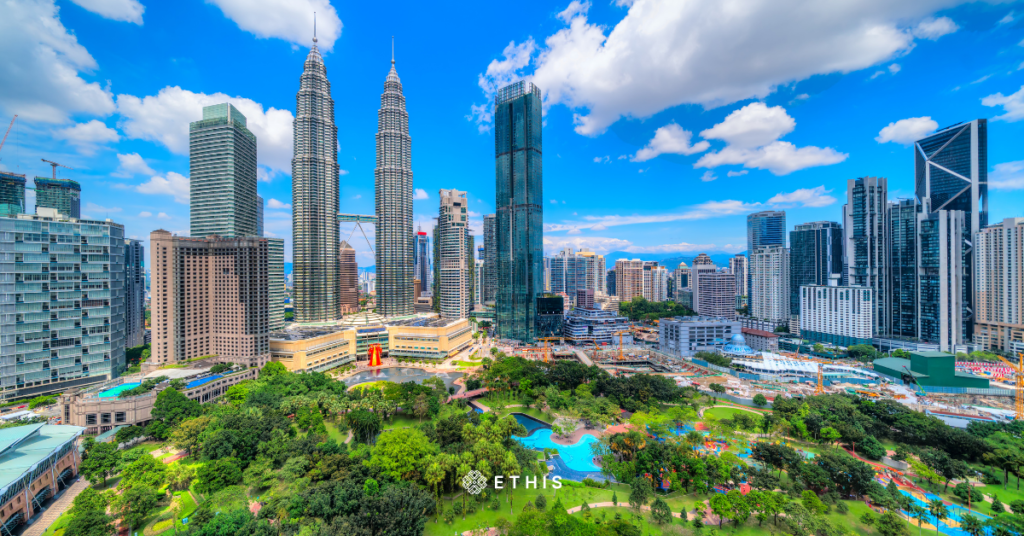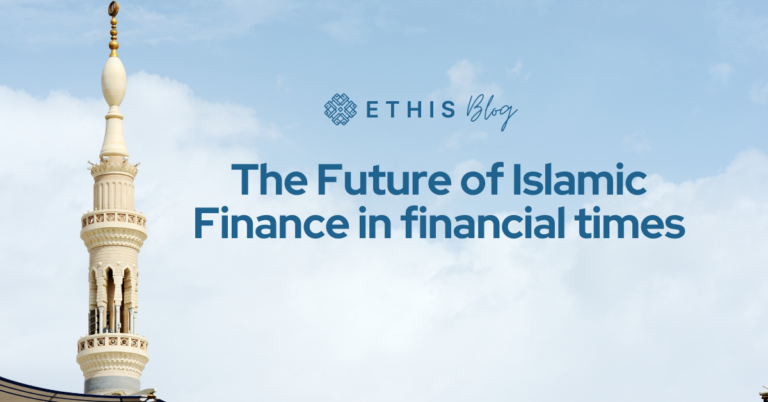
“If a prophet is alive today, chances are he would probably be a financier!” said Tan Sri Azman Mokhtar, MIFC Leadership Council (MLC) Chairman to a roaring crowd at the Global Islamic Finance Forum 2022. Tan Sri Azman is also the Chairman of the Lembaga Tabung Haji Malaysia.
The rhetorical point made by Tan Sri Azman was to demonstrate the power of Islamic finance in addressing the most prominent issues society faces today, such as rising inequality, climate crisis, and runaway inflation.
The MIFC (Malaysia International Islamic Finance Centre) Leadership Council (MLC), which Tan Sri Azman chairs, acts as a platform to provide industry stewardship in enhancing Malaysia’s proposition as a global marketplace and an international gateway for Islamic finance. Members offer thought leadership, drive strategy formulation, and monitor industry initiatives to solidify Malaysia’s leading position in Islamic finance.
Backed by Shariah principles, such as the prevention of harm and circulation of wealth, Tan Sri Azman stressed that Islamic finance needs to accelerate the shift from being only halal to the higher standard and impact of being toyyib.
The Future of Islamic Finance in Malaysia


According to the Global Islamic Economy Indicator, Malaysia is the undisputed global leader in Islamic finance, ranking first among 81 countries for the ninth consecutive year. Similarly, Moody’s Investors Service states the industry could grow faster than conventional banking, with growth driven by the retail segment in 2022 and 2023.
Within Islamic fintech, about 33% of the world’s Islamic financial technology companies have headquarters in Malaysia. The country has been ranked first in the Islamic fintech market and ecosystem, talent, regulation, infrastructure, and capital.
Though Malaysia is described as an international gateway for the rest of the world in Islamic finance, Tan Sri Azman said it must move to the next phase to answer what the people want and address the needs of society.
“Finance has to serve the real economy, which in turn, must serve a progressive and just society. It is our role and moral duty to demonstrate the power of Islamic finance in addressing the biggest challenges facing society today,” Tan Sri Azman said.
He shared his observations on the future of Islamic finance based on three buckets he categorized as awareness, the path to authenticity, and the call to action. He started off with the bucket of awareness.
- We are living in financial times
Financialization, which refers to the increase in size and importance of a country’s financial sector relative to its overall economy, Tan Sri Azman said, is one of the great megatrends of all time besides the free markets and globalization.
Financialization can also be seen through the growing importance of finance in daily activities at the national and global levels. For example, kids nowadays want to be financial engineers instead of civil engineers.
“The global stock of financial assets is about US$470 trillion, according to Tan Sri Andrew Sheng, a renowned Hong Kong-based Malaysian banker, academic, and commentator. “But who knows what the actual number is with the fiat system, and the banking system, the shadow banking system and within that derivates, so who knows…” he said.
Related: Islamic Banking: How Does it Work?
- The global financial system is broken
Tan Sri Azman said the global financial or architectural system is broken based on rising issues such as inequality, severe climate change, and inflation. All “symptoms” are caused by what Tan Sri Azman describes as “something deeper when money is free and debt is high, which breeds overconsumption.”
This fractured system causes increasing financial crises that have been on the rise over the last 25-30 years. This view has been widely supported and attributed to how money is created in the first place, and how money in the current economy is created by private banks when they make loans. Though there is more money in the economy than ever before, there is equally, more debt too.
- But, the financial system has created a lot of value
Despite its flaws, the current financial system has also proven to offer value to the market, from creating career opportunities to providing financial accessibility through loans, Tan Sri Azman said.
“To all the people you’ve helped [as a result of this system] in providing a loan, making an investment, facilitating or value-based intermediating, coming up with fatwa and scholarly work to help people get an education, feeding the poor, etc. But the problem with finance is when financial capitalism causes issues [as in the second submission],” he said. “Some say Karl Marx is a good analysis of capitalism, and it’s on the path of collapsing, but the problem with Karl Marx is that his prescription of what to do was wrong.”
- Islam and Islamic Finance as the solutions
However, Tan Sri Azman admits that there are gaps in practice because though Islam is perfect, Muslims aren’t, and the test is to close that gap.
“As Muslims, we know Islam as an article of faith and belief, and it is our job to derive that faith to prove that, though faith is important in the course of changing destinies, it is not sufficient and requires actualization. Islam is syumul (complete), perfect, rahmatul al alamin,” Tan Sri Azman said.
Tan Sri Azman adds that to get to the point of action and sound impact, Islamic finance must not be the problem and have good tailwinds or driving forces to push through the issues within the current financial system.



“Islamic finance involves the prevention of harm, attainment of maslahah and benefits, circulation of wealth, social justice, money as a medium of exchange and store of value that profit can only be made through participatory and risk sharing structures, transparency, and traceability,” Tan Sri Azman said.
Tan Sri Azman also highlighted the headwinds or challenges that Islamic finance must face to advance. For example, capitalism—though celebrated by experts for its power to adjust, has also created more issues than solutions.
“Now, we have seen the movements around ESG, SDG, stakeholder capitalism, etc., but I would also submit three headwinds,” he said.
In order to cross onto the path to authenticity successfully, Tan Sri Azman highlighted three significant points necessary for the Islamic finance system.
- Overcoming greenwashing
Tan Sri Azman said that the problem with Environmental, Social, and Governance (ESG) and Sustainable Development Goals (SDGs) practices in today’s market is they are often overused and oversold without proper implementation or accountability. Now anyone can claim to be a proponent of ESG or SDG solely for marketing purposes.
However, with proper measurement, data tracking, leadership, governance, laws and regulation, civic awareness, consumer rights, and employees, organizations that claim to uphold ESG and SDG values may be better held accountable for their actions.
Related: Adhering to Islamic principles: 10 financial advantages
- Overcoming green flagging
A phenomenon that, Tan Sri Azman said, involves organizations or individuals who overclaim themselves as Islamic.
“I’m not a scholar, and scholars will go through the shariah aspects to verify such claims, but really at the heart of this, is the discussion of halal and toyyib. How green is green or how Islamic is Islamic?” he said. “By and large, when you go outside of the country and ask a cab driver in London, for example, what Islamic finance is, they’ll usually say it’s the same as conventional finance.”
Of course, there’s also the issue of darurah, among other contexts, proving that this topic requires further insights and conversations.
To him, this idea hinges on moving from form to substance and on to spirit or from halal to toyyib. “A former colleague of mine shared an analogy of halal to toyyib. It’s a bit like halal fried chicken whereby it’s still halal, but fried chicken may not be good for the waistline,” Tan Sri Azman said.
- The risk of green spanning
It was derived from the term coined Greenspan Put, a monetary policy response to financial crises that Alan Greenspan, former chair of the US Federal Reserve, exercised at the beginning of the financial crash of 1987. It was controversial as it led to periods of extreme speculation led by Wall Street investment banks overusing the put’s repurchase agreements and creating successive asset price bubbles.
“This is an issue about money itself. As you know, we shouldn’t be making money on money—money should be a stored value and a medium of exchange. Still, the nature of fiat money in 1971, Richard Nixon went off the gold standard, which heralded an era where they could make money easy,” he said.
“Later, there would be the development of derivates markets, etc. This is a problem because, as you can see right now, this creates a reverse currency, and international markets will determine the price of our money. Still, domestic markets must deal with issues such as interest rates, economic growth, resilience, etc.” Tan Sri Azman added.
Finally, Tan Sri Azman’s last three observations were related to three CTAs or call to actions:
- Halal to Toyyib
Tan Sri Azman highlighted the second and third waves of Islamic finance within Malaysia, praising and emphasizing the important development of notable institutions such as Bank Islam and Tabung Haji and the growth of markets like Sukuk, among others, as key to the growth of Islamic finance within the country. The third wave centered around developing more financial products, and a holistic market that included products such as takaful and pawn shops.
However, leaders must now pivot the focus within the Islamic finance sector to other pressing topics such as affordable housing, the night market economy, and the equity market. “Are we answering the needs of society? This is what we need to do and is the challenge behind halal to toyyib,” he said.
- Malaysia Boleh!
In 1963, Tabung Haji was created when the poverty rate in Malaysia and the larger Malay Muslim population was very high at 85%. In other words, most Muslims in Malaysia were poor and could not afford the Hajj or pilgrimage to Makkah.
“The genius of Pak Ungku (Ungku Abdul Aziz Ungku Abdul Hamid) and others was one of the arguably first—as an independent nation at the time—Islamic institution of mutualization, organization, governance, and investing,” he said.
“In 1988, the Asian financial crisis, how did we come together as a country? We established Dana Modal, Dana Harta, banking consolidation, and selective capital controls; essentially, we came together and solved it. Many times this nation has come together to come through many things. We should recognize and build on their [past leaders] shoulders.” Tan Sri Azman added.
It is through this spirit of Malaysia Boleh that Islamic finance can further grow.
- Coming together
Tan Sri Azman’s last point centered around the belief that to achieve anything, whether the growth of the Islamic finance industry or otherwise, stakeholders must come together to support one another. He also used Surah Al Asr as an example.
“As the governor pointed out and as in Surah a Nahl, at the end of every khutbah, it appeals to Adil, Ihsan, justice, and mercy at the heart of finance because finance has to serve the real economy, and the real economy has to serve society. We must work together to bring Islamic finance in Malaysia forward for the ummah and as an example to the world.”





Top Posts
Islamic P2P Crowdfunding Explained
Halal Money Matters: How Muslims Can Balance Deen and Dunya with Smart Islamic Finance
Halal Investments for Singapore Muslims? It’s time for a shake-up in the Islamic Investments scene.
Smart investment for making Halal money
3 Reasons Why Property Crowdfunding is the Smart Investment for You